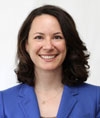Leaders Are Taught, Not Born

Leadership is an integral part of a wealth advisor’s everyday responsibilities as someone responsible for providing holistic and integrated family wealth services.
Sarah Biggerstaff, noted coach and lecturer in the practice of leadership at Yale School of Management, will walk participants through a process to unlock their potential and explore their personal identity as a leader at the 2015 FOX Wealth Advisor Forum.
In preparation for this year’s Forum, we asked Sarah five questions about leadership and the family office. Here’s what she had to say:
FOX: In a collaborative environment like a Family Office advisor team, what leadership traits may ultimately prove most important?
SB: The most effective leader behaviors are incredibly situational. I think in any environment, collaborative or otherwise, it’s important as a leader to be able to read situations and then determine what behaviors to exhibit, develop, or avoid. That being said, when paying close attention to the leadership necessary in highly collaborative environments, we're likely to sense a need for enhanced communication—both listening and speaking, empathy, self-awareness, influence, relationship building, and the ability to be both strategic and tactical, just to name a few.
FOX: How can an advisor assert leadership even if they don’t consider themself a “born leader?”
SB: I think the first and most important step is understanding that most leadership is learned and not something we’re gifted with at birth. That’s a new concept for many of us because we often hear language around “born leaders.” There’s some very interesting research around heritability that shows the vast majority of leadership comes from learned behavior. This is great news! It means that when a person believes they can develop as a leader and then puts time and effort into cultivating that capacity, he or she can become an effective leader, independent of what they are born with.
FOX: How critical would you say good leadership is to accomplishing a collective mission?
SB: I think it’s incredibly important. In the short term, teams, groups or organizations may survive poor leadership. However for those of us who are looking for longevity and seek ongoing accomplishment of our missions, good leadership is the foundation upon which we can do those things. And when I say “good leadership,” I absolutely don’t mean that from a strictly top-down perspective. I’m talking about people, regardless of title and position, leading in their respective ways—both formally and informally.
FOX: What is one way a wealth advisor can show leadership in a family office environment?
SB: Be flexible and keep your eyes open. Find the leadership gap and fill it. In such dynamic, ever-changing environments, an advisor’s ability to do this will be invaluable.
FOX: How might leadership carry over between an advisor’s personal and professional life? Or does it?
SB: It absolutely does. I firmly believe there are no hard lines between the leader and the person. We know how important authenticity is for leaders, so when the person I am is also the leader I am, it’s going to resonate more with others. It’s also helpful because we learn to lead almost completely through the practice of leading. Without the hard line between leader and person, it’s possible to develop as a leader and exhibit leadership in all aspects of life.
-----
Sarah discussed the importance of leadership in "Exploring Your Personal Leadership Brand: Becoming the Master-Builder of Your Future," a featured session at the 2015 FOX Wealth Advisor Forum.
-----

About Sarah Biggerstaff
Sarah is currently a Lecturer in the Practice of Leadership and leadership coach at Yale School of Management. In this capacity, she teaches the core course Leadership Practicum and works one-on-one with MBA, Executive MBA, and Master of Advanced Management student leaders to facilitate their development. Sarah uses a combination of humor, candor, and support to help leaders see new possibilities and take new actions as leverage for personal growth and organizational change. She believes that there is no one-size fits all approach to leadership and works with clients to help them explore and develop their own authentic style.
Sarah also served as an officer in the military and personally understands the challenges, demands, and pleasures of leadership. This background, combined with her experience as a change management consultant and coach, gives her a unique perspective into the world of leadership.